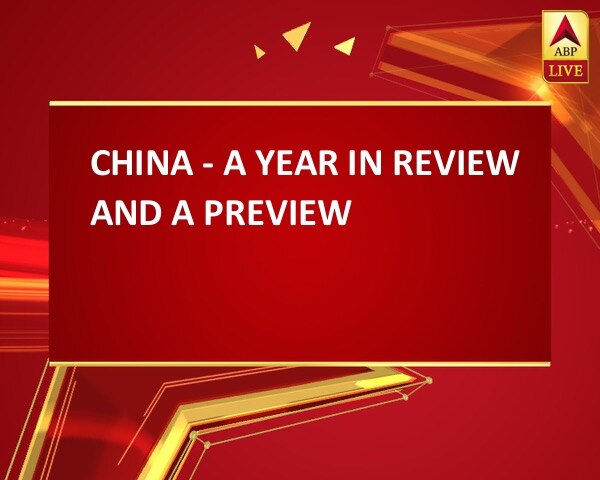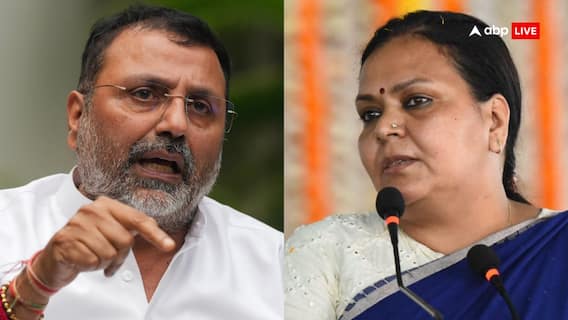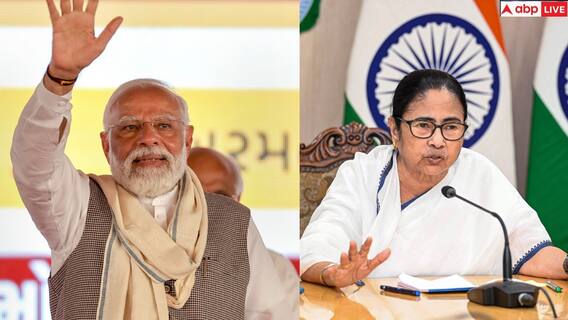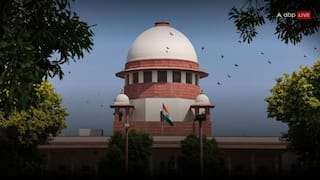
CHINA - A YEAR IN REVIEW AND A PREVIEW

Shanghai [China], Dec. 27 (ANI): As 2017 draws to a close, it is an apt time to assess some significant developments surrounding China over the past twelve months, as well as to look ahead to possible directions in 2018.
As much of the Western world enters the Christmas season, the Communist Party of China (CPC) banned many adherents from observing this festival. For example, Youth League members at the University of South China in Hunan Province were asked to sign a code of conduct that spelled out punishments for engaging in religious activities surrounding Christmas.
The statement they signed included the following: "Communist Party members must be role models in abiding to the faith of communism. [They are] not allowed to have superstitions and blindly follow the opium of Western spirits." Of course, this reflects the dictums of a party that is atheist at heart. However, it is also evidence of the CPC's and President Xi Jinping'sparanoia over Western influence. China claims to be a global force and yet it is politically and culturally building a great wall to keep its citizens faithful to communist ideology and "protected" from Western thought.
19th Party Congress
This five-yearly gathering of the CPC was without peer in China's 2017 calendar. The razzmatazz kicked off on 18 October, where the "core leader" spoke loftily of "the thought of new-era socialism with Chinese characteristics" amidst the goal of achieving "socialist modernization" by 2035 and having China as a front-rank nation by 2049. Xi proclaimed: "This is a new historic juncture in China's development. It will be an era that sees China moving closer to center stage and making greater contributions to mankind."
At the conclave his stocks soared even higher, reflected in "Xi Jinping Thought" being enshrined in the Party Constitution. This places him on a pedestal alongside Mao Zedong and Deng Xiaoping and makes him the most powerful leader in decades. However, it also further erases demarcations between Xi and the CPC, making it harder for anyone to challenge him or his policies.
There remains much debate over whether Xi will seek to lead China beyond when the statutory ten-year period permitted by the party constitution ends. This question was unresolved at the party congress, with no logical successor nominated. In the end, it shows Xi's political astuteness to keep China's elite and the world guessing.
Xi did stick to political norms by adhering to the "seven up, eight down" precedent, however, this term referringto retirement upon reaching the age of 68. The seven members of the Politburo Standing Committee (PSC) elected at the congress were Xi, Li Keqiang, Li Zhanshu, Wang Yang, Wang Huning, Zhao Leji, and Han Zheng. The latter five are all new to the elite committee. None of these PSC members are young enough to succeed Xi in 2022.
Military prowess
Xi presided over a grand military parade celebrating the 90th anniversary of the People's Liberation Army (PLA) at Zhurihe in Inner Mongolia on 30 July. On that occasion, Xi solemnly stated, "I firmly believe that our heroic army has the confidence and capability to defeat all enemies who dare to offend [China]." That such fighting talk is commonly being heard from Chinese officials should be of concern.
At the 19th Party Congress, Xi ordered the PLA to modernize by 2035 and become a top-ranked military by 2050. He stated, "A military force is built to fight. Our military must regard combat readiness as the goal for all its work and focus on how to win when it is called upon."
On the same occasion, Xi radically downsized the Central Military Commission (CMC) from eleven members to seven. The greatest surprise was the sudden elevation of Lieutenant General Zhang Shengmin, secretary of the CMC Commission for Discipline Inspection (CMCCDI). His military anti-corruption unit has already brought down a staggering 100+ PLA generals and 14,000 officers. The CMCCDI's representation on the commission indicates that Xi will not let up on his prosecution of corrupt figures.
By the end of 2017, the loss of 300,000 military posts should have been completed in line with Xi's promise made in September 2015. The goal was to make the PLA leaner and more efficient. Restructuring of the PLA Air Force's Airborne Corps and a serious expansion of the PLA Navy (PLAN) Marine Corps indicates a desire to improve China's expeditionary capabilities for overseas deployments.
Four Type 055 destroyers are under construction, and the commissioning of China's first indigenous aircraft carrier, the Type 001A, will occur in 2018. This past year the PLAN commissioned 16 new surface vessels, including two destroyers, nine frigates/corvettes and five auxiliaries. Output was slightly down on 2016, but it was nonetheless impressive as it was more than double that ofthe US Navy's (USN) seven new surface ships.
The PLA established its first overseas military base in Djibouti on 1 August via a ten-year lease. It is unclear how many troops are based at the 36-hectare heavily fortified base that features helipads and berths for warships. The PLAN Marine Corps appear to be garrisoning the base, which China originally called a "logistics support facility" but which is clearly so much more as it boasts armored vehicles.
Territorial tensions
Throughout 2017 it seems most of the world hadforgotten the Permanent Court of Arbitration's (PCA) ruling in July 2016 that criticized China's territorial ambitions in the South China Sea. Beijing deftly evaded its findings by bringing the Philippines on side and cowing other claimants. President Rodrigo Duterte has completely set aside the findings of the PCA and proclaimed China his new friend.
China's seizure of a USN underwater drone in the South China Sea in December 2016 hinted at a more assertive stance in the disputed maritime area. However, there have not been the tensions that many expected in either the South or East China seas. President Donald Trump has not yet demonstrated a consistent or proactive approach to China either.
That does not mean to say that the PLA and its maritime militia force were passive, far from it. Instead, China was able to enforce existing claims and utilize a time of relative calm to advance its facilities. The Washington-based Asia Maritime Transparency Initiative (AMTI) stated in a report released in December: "Beijing remains committed to advancing the next phase of its build-up - construction of the infrastructure necessary for fully functioning air and naval bases on the larger outposts."AMTI noted that work on permanent structures accounting for a cumulative area of 72 acres occurred on Fiery Cross, Subi and Mischief Reefs in the Spratlys, as well as North, Tree and Triton Islands in the Paracels, during 2017.
Instead of maritime clashes, China's greatest tension was along the Indian border at Doklam. For 73 days in June-August, Indian and Chinese troops faced off in the worst confrontation in years. While that standoff ceased via a disengagement agreement implemented on 28 August, satellite imagery from late 2017 indicated that an estimated 1,600-1,800 PLA soldiers are now camped out nearby. The strategic result is that the PLA has formed a year-round presence near Doklam instead of a seasonal one.
China had certainly never viewed the agreed pullback as a defeat. M. Taylor Fravel, an associate professor at the Massachusetts Institute of Technology, warned, "Before the standoff in June, China's permanent presence in the area had been quite limited.Now that India has chosen to confront China at Doklam, however, China may well seek to rectify this tactical imbalance of forces."
Fravel argued, "When India challenged China's construction crews in June, it only had to move its forces a hundred meters from the existing border. In the future, India may be faced with the uncomfortable choice of deciding whether to risk much more to deny China a greater presence farther inside Doklam or to accept it. This will be a tough decision for any leader to make. Even if India won this round, it may not win the next one."
China is gradually building up forces in Tibet, which will contribute towards rectifying a military imbalance currently skewed in India's favor. Beijing may also test Indian resolve elsewhere in places like Ladakh or Uttarakhand, as well as the Indian Ocean. The bordercould well evolve into a tug of war of national resolve and a test of how the two countries manage their fraught relationship.
Predictions
In many ways, 2017 has been seminal in showing the direction China will continue taking under Xi. Given in his strong mandate at the 19th Party Congress, all need to be watchful as to whether Xi will take it as a license to be more assertive in territorial disputes and in foreign policy.
Employing a strongman style of rule, he already exercises far-reaching authority over the party, Chinese populace, culture, economy and ideology through control of propaganda, media and educational institutes. In June the government introduced tougher cybersecurity laws, and more than 13,000 websites and ten million accounts have been closed since 2015, for instance.
He has effectively wielded the Propaganda Department and, rather than opening up, China is in some ways trying to seal itself off. It is genuinely fearful of Western values such as democracy and freedom of speech gaining traction. Xi may not be deliberately fostering a cult of personality, but rather a cult of party. However, it remains to be seen whether China's media and government can discern the difference.
While there were few high-profile terrorism incidents in China this year, life has become tougher for ten million Uighurs in Xinjiang. Instead of loosening restrictions, the communist leadership clamped down to achieve "perennial order and stability". This sterner policy was heralded by the installation of Chen Quangquo as the province's party secretary in August 2016. The government is now collecting biometric data on millions of Xinjiang residents and Uighur migrants using DNA sequencers purchased from the USA, for example.
The time may come, as more and more Chinese are educated overseas, conduct business and travel abroad, that resistance will grow against the party's relentless efforts to enforce thought control. As human rights worsen and freedoms of religion and speech tighten even further, it seems inevitable that pushback will appear at some point. Some around the world are beginning to wake up to Beijing's semantic trickery that bringing millions out of poverty gives it license to "embark on a human rights development path with Chinese characteristics", i.e. a police state.
Xi, to date, seems incapable of doing wrong. But couldhe begin to lose some of his luster at some point as he micromanages everything in his powerful nation?Perhaps stiffer headwinds for China's economy, or some political disturbance or diplomatic misstep, will cause people to question this Xi-centric authoritarian system.
China continues to isolate Taiwan, with relations with the island remaining cold since President Tsai Ing-wen was elected to office in May 2016. There is no change in China's goal of subsuming Taiwan into the motherland, and this year Panama switched allegiance from Taipei to Beijing. Taiwan now has full diplomatic relations with just 19 countries.
ANI warned a year ago, "In 2016 we saw more clearly than ever before the methodology China will take with other sovereign nations. If they do not succumb to China's considerable economic and diplomatic clout, it will happily use heavier measures and apply pressure. The world must increasingly recognize such a modus operandi and be prepared to confront it."
This year South Korea felt full impact of this policy. Beijing vociferously protested the stationing of a US Army THAAD missile battery in South Korea. While in the end it failed to prevent it, China banned tour groups to South Korea and boycotted chain stores such as Lotte and banned Korean pop stars to underscore its point. China remains fearful of North Korean antics, and it truly seems Beijing is unable to dissuade Kim Jung-on from his nuclear quest. Conflict on the Korean Peninsula is in nobody's interests, including China's, so this tension needs to be studied carefully in the year ahead.
In 2017 more publicity was given to the fact that China is not a benign benefactor, but that it instead has aggressive policies that attempt to influence overseas politics and cultures through soft power and organizations like the United Front. Chinese meddling in politics, business and higher education in Australia created headlines, motivating the government to introduce tougher regulations against foreign subversion. Places like New Zealand and the USA are also becoming more wary of China's insidious strategy of promoting its own interests and conducting espionage. Perhaps throughout 2018 more will realize that the trite phrase "win-win" actually means there is only one winner, China.
In similar fashion, the One Belt, One Road initiative is a key tool for Chinese influence. The China-Pakistan Economic Corridor (CPEC) remains critical to allowBeijing overland access to the Arabian Sea. Development of Gwadar Port continues, and it may be only a matter of time before PLA troops are stationed on Pakistani soil, ostensibly to protect Chinese investments. A terrorist or insurgent act along the CPEC could serve as a catalyst for China to insert itself in this way, so this bears watching. Similarly, any other Chinese efforts to create "logistics bases" on the periphery of the Indian Oceanmust be carefully scrutinized.(ANI)
This story has not been edited. It has been published as provided by ANI
Top Headline
Trending News

and tablets



























